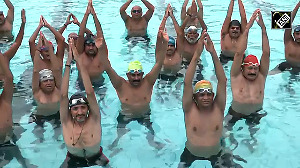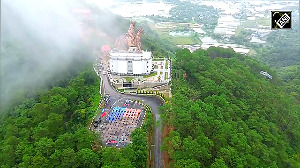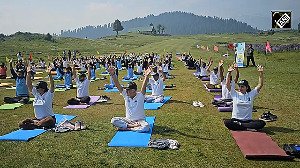Britain hopes that after the forthcoming Lok Sabha elections the next government will carry forward the economic reforms process that should see India emerging as the third biggest economy in the world over the years to come.
"I am lucky to be here (in India) when economic growth is hitting 8 per cent. Agriculture, manufacturing and the service sector looks good...the message that I get is that post elections, the new government is going to have a very exciting time in taking the reforms process forward," British High Commissioner Sir Michael Arthur said, addressing a Confederation of Indian Industry meeting in Chandigarh.
On his first official visit to Chandigarh after taking over as high commissioner from his predecessor Sir Rob Young, he said the trade between India and Britain stood at $7 billion which, he hoped, would touch $9 billion by the end of next fiscal.
"Britain is third biggest investor in India and as FDI increases we hope to top the chart. Globally, India is eighth biggest investor in our country, with major presence in IT, bio-tech and pharmaceuticals."
He said his country saw outsourcing as a major growth area. "We are not a protectionist government. This is a feature of globalisation," he said when replying to questions on concerns of some British companies in this field.
Sir Arthur said that Indian companies were becoming internationally competitive and more companies back home have registered with the London Stock Exchange than New York Stock Exchange and Nasdaq put together.
On the World Trade Organisation issues, he said, Britain appreciated India's concerns.
"I recognise we have different interests, that is OK."
Sir Arthur said that people-to-people contact between the two countries and a long-shared history had led to further strengthening of ties between the two nations.
"Half-a-million Indians visit Britain every year. We supply more tourists to India than any other country. The non-resident Indian community in our country has a strong presence of 1.3 million. The NRIs have come right on top of political, economic and educational life with their hard work," he said.
He said that every year 14,000 students come to Britain for studies, a figure that has increased by four times in the past few years, he said.
"The United States has 17,000 students from India every year. We would like to take our figure to 25,000 in the coming years."
Sir Arthur said that what was distinctive and what binds both countries was that both were modern societies and economies on the move and were regional leaders in their own sense.
Later, Sir Arthur inaugurated a branch of the British Library in Sector 9 here. Deputy Director General of the British Council Robin Baker and Haryana Chief Minister Om Prakash Chautala were also present on the occasion.






